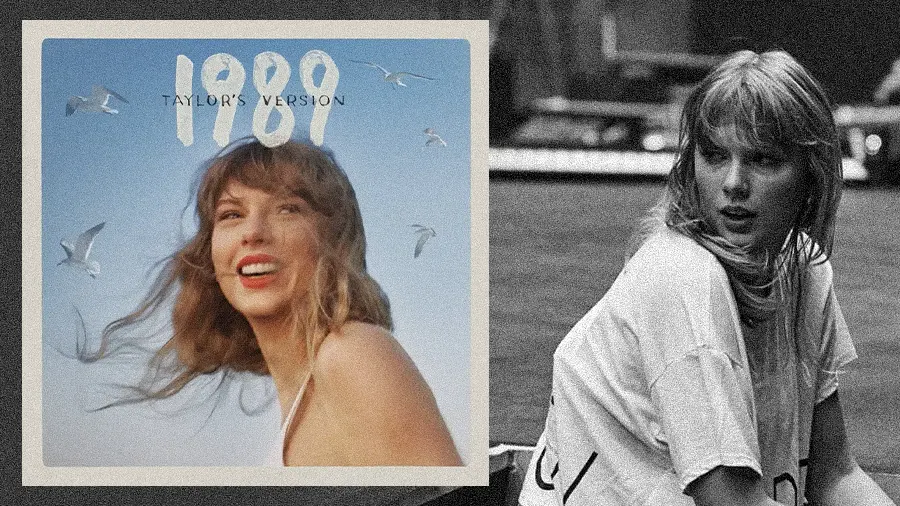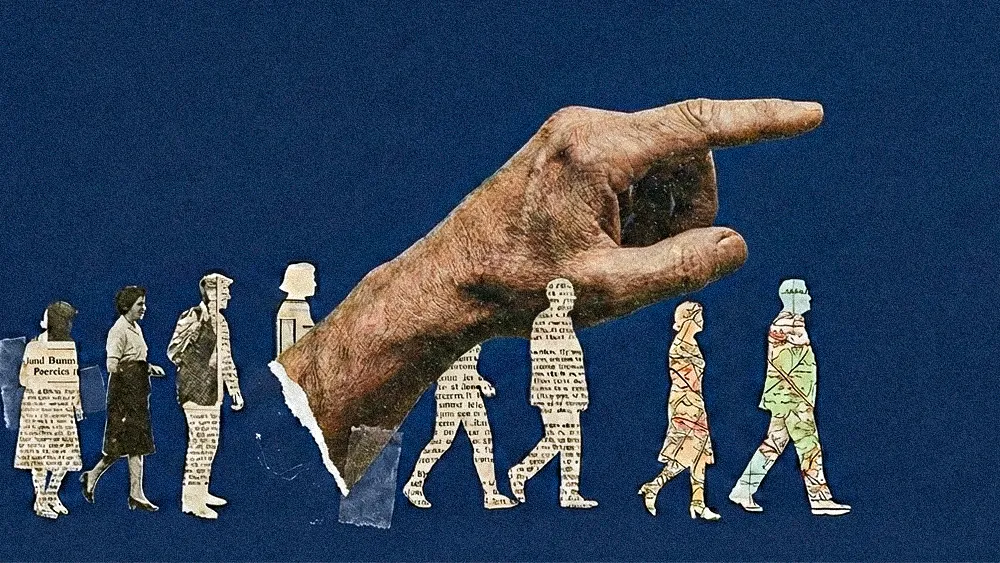Workplaces that welcome pop culture and life beyond the job are stronger, more creative

Key Points
The cultural phenomenon of Taylor Swift and Travis Kelce offers a masterclass for business leaders on cutting through the noise of “boring-to-boring” corporate content.
Paula Ximena Mejia, VP of Marketing at Wix, argues that pop culture moments provide a powerful opportunity to showcase a brand’s personality in an era of generic, AI-generated content.
Mejia explains that the strategy of leveraging personality is not just for marketing, but also for building a healthy internal culture.
A culture built on autonomy and trust allows employees to be more creative and collaborative, ultimately driving better business outcomes.
We're not in Severance. Employees are not emotionless, history-less bodies walking through a corridor. They are fully formed humans, and their experiences shape them. It is natural to be a little bit silly and authentic, and when that's absent, it becomes strange.

Paula Ximena Mejia
VP of Marketing
Wix
Taylor Swift and Travis Kelce’s love story has become a cultural phenomenon, transcending pop culture and sports to dominate social conversation, with their recent engagement announcement pushing the story even further into the spotlight. The release of Swift’s next album is poised to do the same, with a new report from BambooHR anticipating 6% of salaried workers taking off for drop day in what they call the “Swift Shift”.
Savvy business leaders see more than entertainment, recognizing lessons in building genuine engagement. By tapping into the cultural zeitgeist, they are finding new ways to create authentic connections that strengthen both marketing efforts and workplace culture.
We spoke with Paula Ximena Mejia, VP of Marketing at Wix, a seasoned marketing leader who has built product-led growth engines reaching over 280 million users while managing and scaling teams. She argued that the biggest moments in pop culture aren’t a distraction from work but a masterclass in how to do it better, both for a brand’s external persona and an organization’s inner workings.
Moments like the Swift-Kelce engagement have the potential to deeply influence the internal dynamics of an organization. Mejia argued that a healthy and creative workplace is one where individuals are encouraged to bring their full selves, rejecting a dystopian vision of work that is both unnatural and unproductive. Pop culture, she said, acts as a natural conduit to forming those workplace connections.
No ‘innies’ or ‘outies’: “We’re not in Severance,” Mejia stated, referencing the popular TV show about surgically separating work and personal memories. “Employees are not emotionless, history-less bodies walking through a corridor. They are fully formed humans, and their experiences shape them. It is natural to be a little bit silly and authentic, and when that’s absent, it becomes strange.”
Mejia explained that building a culture that embraces employees as their full selves is an intentional choice that must be designed. This is especially important for organizations rooted in creativity, where the internal culture has to mirror the brand’s own ethos and energy in order to be authentic.
Inspiration from play: “The New York Wix offices are called ‘the playground’ for a reason,” she said. “It’s the idea that creative inspiration can come from play. It starts with the ethos of the company and the goals of the product. Wix is a design-oriented platform, enabling users to experience creative freedom and bring ideas to life, and as a brand and an employer, you have to embody that. The environment you build has to reflect the product you create.”
A failure to fail: “It’s a culture of ‘try and fail,’ as long as you learn something. You won’t be punished if you fail,” she added. By normalizing failure as part of growth, Mejia emphasized, organizations create the conditions for real innovation to thrive.
Ultimately, this vibrant culture isn’t manufactured through programmed activities or company perks. Mejia revealed that the true engine behind it is a deeper, more foundational principle: autonomy. The rapport, creativity, and collaboration emerge naturally from a system built on trust and ownership, not top-down control.
The role of autonomy: “Collaboration happens naturally because employees’ time is not tightly managed,” she said. “Teams are given projects to complete together and are expected to share progress and deliver, but there is no rigid scheduling of tasks. That freedom makes it natural for colleagues to go out for lunch together or meet after work, developing that rapport.”
The emphasis on authenticity and personal connection, while foundational to internal culture, also directly informs Mejia’s approach to external marketing. She believes that a human-centric approach is essential for earning attention in an oversaturated market.
The B2B problem: “B2B doesn’t have to be boring-to-boring,” Mejia said. “Even brands with serious products are rethinking how they present themselves because sales cycles are longer. Buyers now enter conversations with strong opinions about what a product can or cannot do, and those perceptions are shaped by the thoughts and feelings they already have about the brand.”
Let’s get personal: “Now there’s the ChatGPT factor, where much of the content being produced lacks a personal spin,” she explained. “It’s often easy to spot, and it doesn’t carry a real sense of personality. Cultural moments offer an opportunity for individuals and brands to stand out by showing character in ways that might not have been considered before.”
Mejia’s reflections ultimately returned to Taylor Swift herself, noting that her admiration extends beyond the music and marketing savvy to the authenticity and strength Swift embodies. Cultural figures like Swift can provide useful reference points in professional contexts—like Mejia’s own LinkedIn post using the pop star’s engagement announcement as part of a tongue-in-cheek commentary on the B2B sales journey—offering a shared language that makes complex ideas about leadership and connection easier to grasp. “I think she is a superhuman being. There’s just something about her as a woman being so successful and unapologetic about it that I really respect.”
Now there’s the ChatGPT factor, where much of the content being produced lacks a personal spin. It’s often easy to spot, and it doesn’t carry a real sense of personality. Cultural moments offer an opportunity for individuals and brands to stand out by showing character in ways that might not have been considered before.

Paula Ximena Mejia
VP of Marketing
Wix
Now there’s the ChatGPT factor, where much of the content being produced lacks a personal spin. It’s often easy to spot, and it doesn’t carry a real sense of personality. Cultural moments offer an opportunity for individuals and brands to stand out by showing character in ways that might not have been considered before.

Paula Ximena Mejia
VP of Marketing
Wix
Related articles
TL;DR
The cultural phenomenon of Taylor Swift and Travis Kelce offers a masterclass for business leaders on cutting through the noise of “boring-to-boring” corporate content.
Paula Ximena Mejia, VP of Marketing at Wix, argues that pop culture moments provide a powerful opportunity to showcase a brand’s personality in an era of generic, AI-generated content.
Mejia explains that the strategy of leveraging personality is not just for marketing, but also for building a healthy internal culture.
A culture built on autonomy and trust allows employees to be more creative and collaborative, ultimately driving better business outcomes.

Paula Ximena Mejia
Wix
VP of Marketing

VP of Marketing
Taylor Swift and Travis Kelce’s love story has become a cultural phenomenon, transcending pop culture and sports to dominate social conversation, with their recent engagement announcement pushing the story even further into the spotlight. The release of Swift’s next album is poised to do the same, with a new report from BambooHR anticipating 6% of salaried workers taking off for drop day in what they call the “Swift Shift”.
Savvy business leaders see more than entertainment, recognizing lessons in building genuine engagement. By tapping into the cultural zeitgeist, they are finding new ways to create authentic connections that strengthen both marketing efforts and workplace culture.
We spoke with Paula Ximena Mejia, VP of Marketing at Wix, a seasoned marketing leader who has built product-led growth engines reaching over 280 million users while managing and scaling teams. She argued that the biggest moments in pop culture aren’t a distraction from work but a masterclass in how to do it better, both for a brand’s external persona and an organization’s inner workings.
Moments like the Swift-Kelce engagement have the potential to deeply influence the internal dynamics of an organization. Mejia argued that a healthy and creative workplace is one where individuals are encouraged to bring their full selves, rejecting a dystopian vision of work that is both unnatural and unproductive. Pop culture, she said, acts as a natural conduit to forming those workplace connections.
No ‘innies’ or ‘outies’: “We’re not in Severance,” Mejia stated, referencing the popular TV show about surgically separating work and personal memories. “Employees are not emotionless, history-less bodies walking through a corridor. They are fully formed humans, and their experiences shape them. It is natural to be a little bit silly and authentic, and when that’s absent, it becomes strange.”
Mejia explained that building a culture that embraces employees as their full selves is an intentional choice that must be designed. This is especially important for organizations rooted in creativity, where the internal culture has to mirror the brand’s own ethos and energy in order to be authentic.
Inspiration from play: “The New York Wix offices are called ‘the playground’ for a reason,” she said. “It’s the idea that creative inspiration can come from play. It starts with the ethos of the company and the goals of the product. Wix is a design-oriented platform, enabling users to experience creative freedom and bring ideas to life, and as a brand and an employer, you have to embody that. The environment you build has to reflect the product you create.”
A failure to fail: “It’s a culture of ‘try and fail,’ as long as you learn something. You won’t be punished if you fail,” she added. By normalizing failure as part of growth, Mejia emphasized, organizations create the conditions for real innovation to thrive.

Paula Ximena Mejia
Wix
VP of Marketing

VP of Marketing
Ultimately, this vibrant culture isn’t manufactured through programmed activities or company perks. Mejia revealed that the true engine behind it is a deeper, more foundational principle: autonomy. The rapport, creativity, and collaboration emerge naturally from a system built on trust and ownership, not top-down control.
The role of autonomy: “Collaboration happens naturally because employees’ time is not tightly managed,” she said. “Teams are given projects to complete together and are expected to share progress and deliver, but there is no rigid scheduling of tasks. That freedom makes it natural for colleagues to go out for lunch together or meet after work, developing that rapport.”
The emphasis on authenticity and personal connection, while foundational to internal culture, also directly informs Mejia’s approach to external marketing. She believes that a human-centric approach is essential for earning attention in an oversaturated market.
The B2B problem: “B2B doesn’t have to be boring-to-boring,” Mejia said. “Even brands with serious products are rethinking how they present themselves because sales cycles are longer. Buyers now enter conversations with strong opinions about what a product can or cannot do, and those perceptions are shaped by the thoughts and feelings they already have about the brand.”
Let’s get personal: “Now there’s the ChatGPT factor, where much of the content being produced lacks a personal spin,” she explained. “It’s often easy to spot, and it doesn’t carry a real sense of personality. Cultural moments offer an opportunity for individuals and brands to stand out by showing character in ways that might not have been considered before.”
Mejia’s reflections ultimately returned to Taylor Swift herself, noting that her admiration extends beyond the music and marketing savvy to the authenticity and strength Swift embodies. Cultural figures like Swift can provide useful reference points in professional contexts—like Mejia’s own LinkedIn post using the pop star’s engagement announcement as part of a tongue-in-cheek commentary on the B2B sales journey—offering a shared language that makes complex ideas about leadership and connection easier to grasp. “I think she is a superhuman being. There’s just something about her as a woman being so successful and unapologetic about it that I really respect.”




